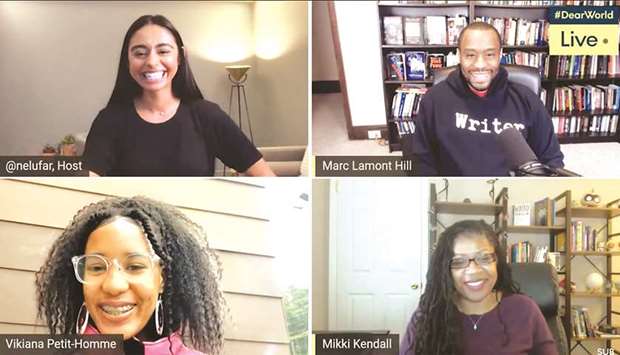Emphasising that pervasive, systemic racism in the US is being worsened by the disproportionate impact of Covid-19 on minorities, experts on racial justice have told Doha Debates’ #DearWorldLive programme that Americans and their leaders must take urgent and overdue action to end racism in their country.
A production of Qatar Foundation’s Doha Debates, the programme was the first in a five-part series of weekly #DearWorldLive episodes examining racial injustice in the US and around the world.
#DearWorldLive host Nelufar Hedayat moderated the discussion, which included Marc Lamont Hill, an activist, author, and university professor; Mikki Kendall, an activist and author; and Vikiana Petit-Homme, a Boston college student who organised thousands of teenagers to participate in gun reform efforts. Hill said that racism in America is vast and longstanding, explaining, “We have to recognise that racial injustice, racial inequality, [and] White supremacy are integral features of American life. There’s never been a moment where there’s been an America and there haven’t been these issues.”
He also said Covid-19 has worsened racial disparities, adding “What Covid-19 did is put yet another spotlight on the intersections of race, class, gender, and ability. Social distancing is an index of privilege as much as of medical awareness.”
Kendall underscored the Covid-19 racial challenges by saying, “Stay home and stay alive — but we didn’t do anything about homelessness. But we didn’t do anything about unsafe homes. We didn’t do anything about what it means to be able to afford to stay home.
“And so now we’re saying that we want people to go back to work to keep the economy going, but we don’t want them to need anything from us — we just want them to provide this.”
Saying the Black Lives Matter movement had put a fresh spotlight on racial inequality in the US, Kendall said Americans — and, in many cases, the world,— are witnessing discrimination and racist incidents like never before, thanks to videos of real-life tragic episodes seen on social media.
“I think for people outside the US it’s almost impossible ... to believe how bad things can be until you have those videos,” she said, adding, “To see how casual that violence can be — it changes how we perceive the conversation about race and racism. And for a lot of people who hadn’t seen it before, they suddenly realised it could be them.”
Petit-Homme said it’s vital for Americans and people around the world to acknowledge racism as a first step to overcoming it. “It’s very important to have this conversation right now, because anti-Blackness is a global struggle, racism is a global issue, and I think looking at the US is a good place to start,” she said.

The panellists during the discussion.
